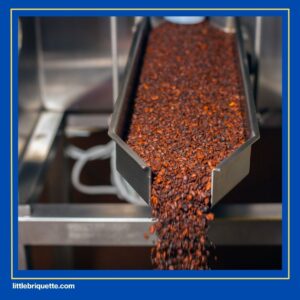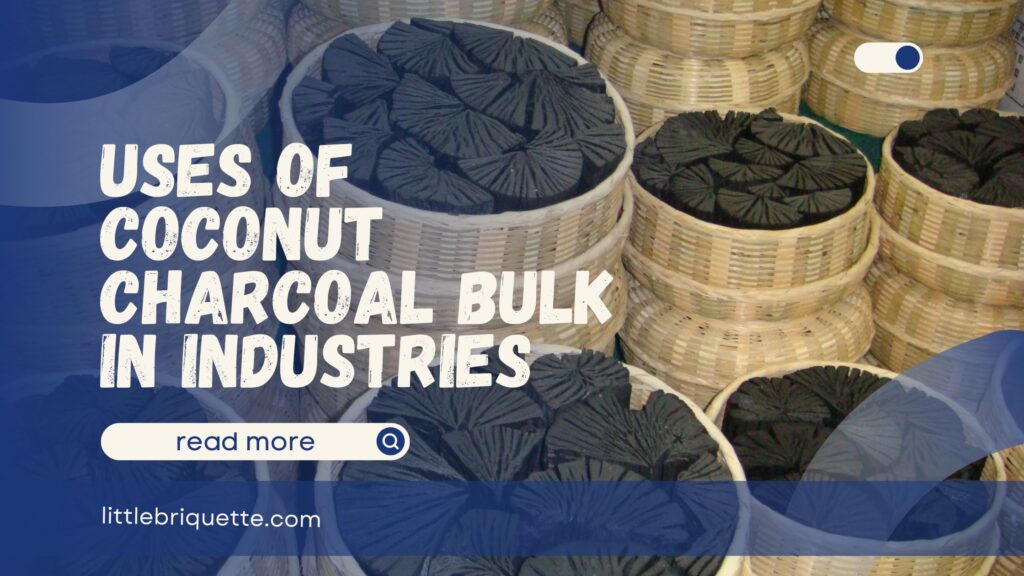Coconut charcoal bulk refers to coconut shell charcoal produced in large quantities or on an industrial scale. This type of charcoal is made from unused coconut shells or other coconut industry waste. Utilizing coconut shell waste makes this charcoal environmentally friendly. The production process involves drying and burning coconut shells at high temperatures under controlled conditions to produce high-quality charcoal. Mass production is aimed at meeting user needs, particularly in industrial sectors.
The primary advantage of coconut charcoal bulk is its eco-friendly nature and efficient usage. This type of charcoal has a high burning capacity, providing stable heat and a clean taste without unwanted odors. These qualities make coconut charcoal ideal for various industries, including food and beverage, cosmetics, pharmaceuticals, and as raw materials for manufacturing various products.
The use of coconut charcoal bulk also benefits the environment by reducing non-biodegradable coconut waste and providing economic value from that waste. Coconut shell waste is difficult to decompose and can pollute air and water. Processing it into charcoal adds value and boosts the local economy. Modern, efficient production processes ensure consistent quality in the charcoal produced. Thus, mass production not only positively impacts industries but also contributes to sustainable waste management and environmental conservation efforts.
Uses of Coconut Charcoal in Industries
Coconut charcoal bulk serves significant purposes across various modern industries. Here are several industries that utilize coconut charcoal as fuel or raw material for product manufacturing.
Food and Beverage Industry

Coconut charcoal is renowned and increasingly popular for its use as a fossil fuel alternative. Therefore, its primary use in the industry is within the food and beverage sector. This industry heavily relies on coconut charcoal bulk as its main fuel for cooking, offering various advantages. Coconut charcoal is capable of providing stable and intense heat, crucial for cooking processes such as grilling, smoking, and roasting. Its high burning capacity allows for precise temperature control, enabling chefs to achieve consistent and satisfying food textures and flavors. Moreover, coconut charcoal does not impart unwanted odors or tastes to food, thus preserving authenticity and flavor quality.
In addition to cooking processes, coconut charcoal is also used for smoking to impart desired flavors to fish, meat, and other foods. Its dense and uniform texture ensures even heat distribution, critical for achieving perfect outcomes in food industries that prioritize quality and presentation. With its environmentally friendly and sustainable properties, coconut charcoal is increasingly the top choice for restaurant owners and professional chefs who value food quality and positive environmental impact.
Coconut Charcoal Bulk for Cosmetics Industry

The cosmetics industry utilizes coconut charcoal as an active ingredient in various skincare and beauty products. Coconut charcoal is renowned for its ability to absorb dirt, excess oil, and toxins from the skin, making it ideal for facial cleansers, scrubs, and masks. Its use helps deeply cleanse pores and remove dead skin cells, enhancing skin texture and leaving a clean and fresh appearance.
Furthermore, coconut charcoal is often used in products aimed at reducing acne and treating other skin conditions due to its antibacterial and anti-inflammatory properties. This makes it suitable for skincare products targeting specific skin issues while maintaining overall skin moisture and balance. With increasing demand for natural and organic ingredients in the cosmetics market, coconut charcoal bulk is a popular choice among cosmetic manufacturers committed to providing effective and environmentally friendly products to their consumers.
Pharmaceutical Industry

Coconut charcoal’s use in the pharmaceutical industry stems from its ability to be used in filtration and purification processes for water and air. It serves as an adsorbent to remove contaminants and toxic substances from various pharmaceutical products such as medications and supplements, enhancing their safety and effectiveness.
Coconut charcoal is also utilized in the production of tablets and capsules. As a raw material, it benefits tablet compression processes by providing good density and ensuring consistent release of active ingredients within the digestive system. This makes coconut charcoal an ideal choice in the pharmaceutical industry to meet stringent quality standards and improve the performance of pharmaceutical products. With its natural, safe, and efficient production process, coconut charcoal continues to be a sought-after material in modern pharmaceutical industries.
Energy Industry

In the energy industry, coconut charcoal serves as an alternative fuel for various applications. Its high burning capacity and stable heat make it suitable for use in small-scale power generation and other energy production processes. Using coconut charcoal as a fuel can help reduce dependence on fossil energy sources and decrease greenhouse gas emissions, as this type of charcoal is considered more environmentally friendly.
Coconut charcoal is also used in various industrial applications requiring high heat and good resistance to temperature fluctuations, such as in metallurgical and chemical manufacturing industries. Its consistent quality and ability to generate intense heat make it a popular choice in optimizing industrial processes that require reliable and efficient energy sources. With increasing demand for sustainable energy sources, mass-produced coconut charcoal can play a significant role in supporting the transition towards cleaner and more environmentally friendly energy in the future.
The Textile Industry

Coconut charcoal has various uses in the textile industry on a mass scale. One of its uses is as a material for textile dyeing processes. Coconut charcoal is used in the dyeing process to help bind color pigments to textile fibers. This process is crucial for creating long-lasting and vibrant colors on fabrics. Additionally, coconut charcoal is also used in textile finishing processes. Finishing is the final stage in textile production that involves special treatments to enhance fabric properties such as smoothness, strength, and resistance to water or fire. Coconut charcoal can be utilized in finishing to achieve the desired end results on various types of fabrics.
Furthermore, coconut charcoal plays a role in reducing environmental pollution generated by the textile industry. Its use as a chemical substance in dyeing and finishing processes helps reduce dependence on harmful chemicals and synthetic dyes that can pollute water and the surrounding environment. By adopting coconut charcoal on a mass scale, the textile industry can improve its environmental footprint while maintaining quality and efficiency in textile production. Therefore, coconut charcoal is not only an environmentally friendly choice but also contributes to sustaining the textile industry as a whole.
High-Quality Coconut Charcoal Supplier
The only high-quality coconut charcoal supplier in Indonesia is Little Briquette. You can obtain coconut charcoal produced with a focus on quality by contacting this number.

